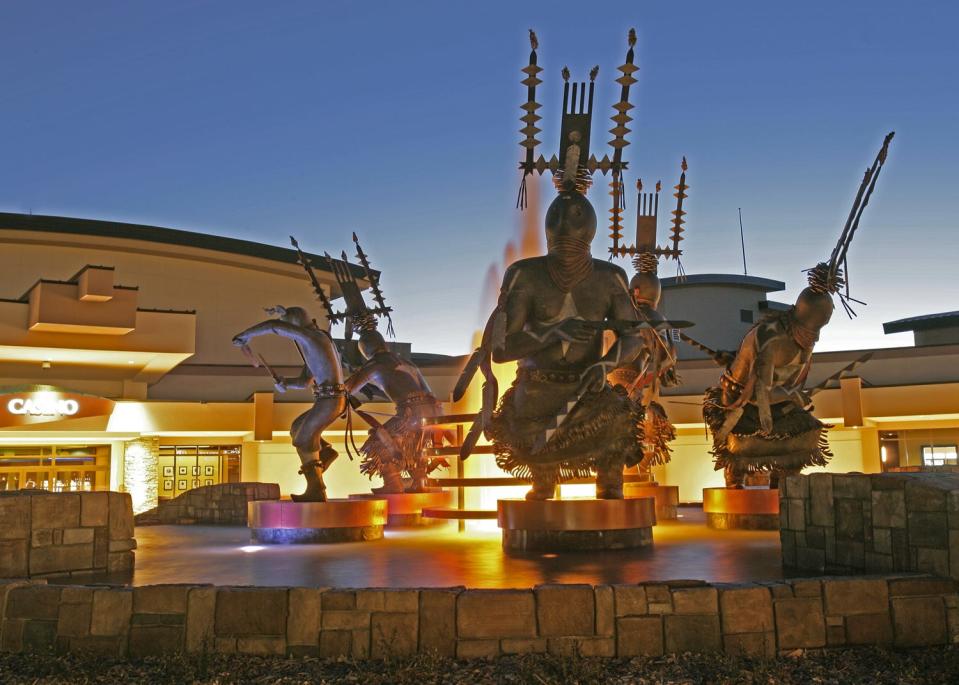Amid coronavirus hard times, US government must honor its commitments to Native Americans
The global economic and social devastation brought by the COVID-19 pandemic is revealing stark contrasts between the fortunate and vulnerable in American society. Predictably, it appears that our Native American communities will once again have to pick ourselves up by the bootstraps in the face of what appears to be slow, inadequate relief from the federal government.
In addition to failing infrastructure, lack of access to health care and a sizable percentage of the population at risk for the most severe COVID-19 complications, tribal communities are also facing bleak economic prospects. Our most consistent revenue generator — land-based casino gaming — has disappeared virtually overnight.
This is why the trust relationship between the federal government and tribal nations is so critical. Although tribes' economic development efforts are designed to foster nation-building and self-determination in the advancement of tribal sovereignty, our businesses are meant to complement not supplant the funds owed to us by our treaties and compacts with the federal government — not supplant them.
Remember America's commitments
Federal financial relief for tribes should not be viewed as the equivalent of bailouts for corporations. That ignores hundreds of years of government-to-government negotiations between tribal nations and the U.S. government. It demonstrates a disregard for the hardships and encumbrances tribes have experienced during America’s expansion into a global economic powerhouse.
We paid for these relief packages generations ago through the forced secession of our lands, which compromised our cultures, traditional values and ways of life. America became and has remained one of the most prosperous countries in the history of the world because of these numerous unique agreements with tribes, which subsequently provided access to the land and natural resources that built this great nation.

It is critical that in this time of suffering, America does not forget her commitments to Native American people. We have certainly not forgotten the sacrifices of our ancestors, our elders, our families, and we are not remiss regarding the looming plight of our descendants.
Several tribes have already spoken out about their unfortunate treatment by the U.S. government during the COVID-19 crisis. President Jonathan Nez (Navajo Nation) recently stated in a tribal town hall that "We feel that the United States government once again has ignored or even left out the first residents, the first people, the first citizens of this country: Indigenous people."
Hotline: Share your coronavirus story
And after the Secretary of the Interior decided unilaterally late last month to disestablish the Mashpee Wampanoag Tribe, Chairman Cedric Cromwell called the government’s actions cruel and unnecessary. "We the people of the First Light have lived here since before there was a Secretary of the Interior, since before there was a State of Massachusetts, since before the Pilgrims arrived 400 years ago," he said. "We have survived, we will continue to survive. These are our lands, these are the lands of our ancestors, and these will be the lands of our grandchildren.”
Tribes must diversify to reduce risk
Just as the federal government has a sacred responsibility to American Indians and Alaska Natives, so too do our tribal governments. It is our leaders' responsibility to develop a modern, diversified portfolio of business that insulates our tribal economies from future risks like pandemics.
Revenues from land-based gaming have dramatically improved conditions on many reservations. Still, gaming is not a magic pill. This is a mischaracterization I encounter frequently talking with people outside Indian country. As of 2018, fewer than half of America's 574 federally recognized tribes operate casinos, and their revenues are uneven based on location. In 2018, 19% of tribal casinos controlled 75% of Indian gaming revenue.
Joe Biden's checklist: Make coronavirus relief work for families and small businesses. Help them now.
Tribes must evaluate opportunities outside of land-based operations like casinos, hotels, and natural resources. They should begin, or continue, to diversify as quickly as possible. Some tribes are finding success in financial technology as a new business opportunity. The internet is particularly attractive to geographically isolated tribes, who, for the first time, can use the web to reach beyond the boundaries of their reservations to offer products and services to the world.
Given the United States’ trust responsibility to the indigenous nations of this land, Congress should act quickly to deliver promised funds to tribes impacted by the COVID-19 pandemic as a priority. Meanwhile, tribes should continue to use their sovereignty, resources and all inherent competitive advantages, paid in full by our ancestors, to diversify into innovative industries that won't be devastated by shelter-in-place orders and economic downturns.
Gary Davis, an enrolled member of the Cherokee Nation of Oklahoma, is founder and editor of Native Business Magazine, executive director of the Native American Financial Services Association and past president and CEO of the National Center for American Indian Enterprise Development. He is also a rapper and an actor. Follow him on Twitter: @litefoot
You can read diverse opinions from our Board of Contributors and other writers on the Opinion front page, on Twitter @usatodayopinion and in our daily Opinion newsletter. To respond to a column, submit a comment to letters@usatoday.com.
This article originally appeared on USA TODAY: Coronavirus pandemic no time for US government to fail Native Americans

